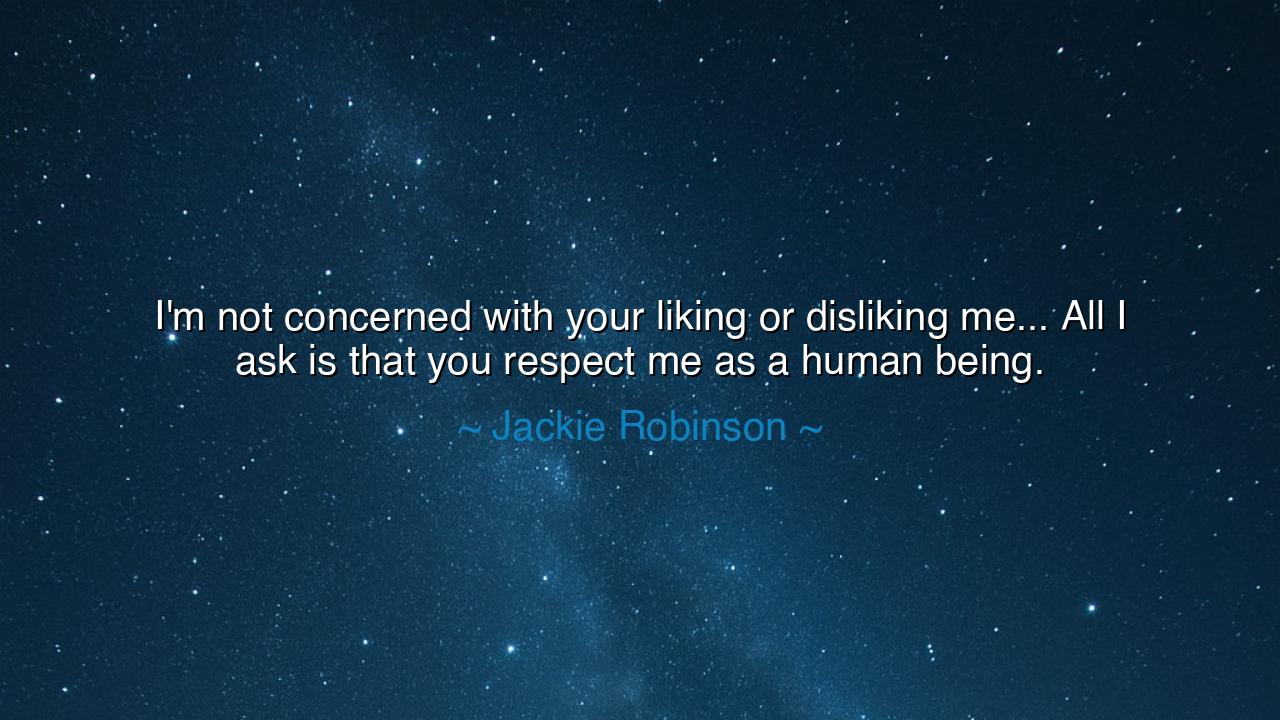
I'm not concerned with your liking or disliking me... All I ask
I'm not concerned with your liking or disliking me... All I ask is that you respect me as a human being.






"I'm not concerned with your liking or disliking me... All I ask is that you respect me as a human being." – Jackie Robinson. These words, spoken by the great pioneer of civil rights and baseball, Jackie Robinson, carry a timeless lesson about the essence of human dignity and the power of self-respect. Robinson’s journey, filled with adversity and suffering, was one of resilience and grace under immense pressure. In this simple yet profound statement, he reveals the truth that respect is not dependent on the approval of others, but on the intrinsic worth of every human being. To demand respect is to demand recognition of our shared humanity, a powerful assertion of dignity that transcends the need for personal admiration.
In the ancient world, respect was not something to be earned by the whims of others, but something rooted in the very nature of existence. The great philosophers spoke of a man’s right to be recognized for his virtue, his integrity, and his humanity, not his popularity or likability. Socrates, a man who was often reviled for his unconventional ideas, still commanded respect through his commitment to truth and virtue. He sought not the approval of the masses, but the respect that arises from living a life in alignment with wisdom and moral courage. Similarly, Jackie Robinson's call for respect was not for fame or adulation, but for recognition as a person of worth, deserving of the same humanity as those around him.
Consider, too, the noble example of Mahatma Gandhi, who, like Robinson, stood in defiance of a system that sought to degrade and humiliate him. Gandhi, in his campaigns for Indian independence, was not concerned with the approval of his oppressors, but with their recognition of his right to live with dignity. Gandhi understood that respect comes not from others' favor, but from the steadfast refusal to accept degradation. His entire life was a testament to this truth. In every act of civil disobedience, in every silent protest, he called for nothing but the respect that arises from one’s humanity, a demand that transcended the petty judgments of others.
Jackie Robinson’s life was a testament to this principle. In his momentous crossing of the color line in baseball, Robinson was subjected to insults, hatred, and dehumanization, yet he stood firm. His focus was never on the hatred directed toward him, but on his right to be treated with the same respect and dignity as any other person. In the face of adversity, Robinson knew that the true measure of his worth lay not in whether others liked him, but in whether they recognized him as a human being, deserving of equal rights and opportunities. His actions on the field were not just about baseball; they were about demanding respect for all who were marginalized and oppressed.
This lesson, taught through Robinson’s courage, is as relevant today as it was in his time. Respect, at its core, is a recognition of shared humanity, not based on superficial judgments or the fleeting approval of others. It is easy to be concerned with the opinions of others, to crave their approval, but this leads us to a hollow existence. The wise of old taught that the greatest form of power is the ability to stand firm in one’s own truth, regardless of the approval or disapproval of those around us. True respect comes from within, from the understanding that our value does not depend on external validation but on the simple fact that we exist as human beings worthy of dignity and fairness.
In our own lives, let us follow Jackie Robinson’s example. We are often bombarded by the need to be liked, to be accepted, and to conform to the expectations of others. But liking is a fleeting thing, often based on trivial matters, whereas respect is an enduring force that acknowledges the depths of our shared humanity. Let us live in a way that demands respect not through what others think of us, but through how we treat others, how we stand firm in our convictions, and how we carry ourselves with dignity. True power lies in the ability to remain steadfast in our self-worth, regardless of how others may feel about us.
Therefore, let us respect ourselves first, and in doing so, we invite the world to recognize us for the human beings we are. We need not seek the approval of others, for in standing tall with respect for ourselves and others, we pave the way for a life of dignity, purpose, and unshakable strength. In a world full of judgments and opinions, let us stand firm in our humanity, knowing that respect is the foundation upon which true greatness is built.






AAdministratorAdministrator
Welcome, honored guests. Please leave a comment, we will respond soon